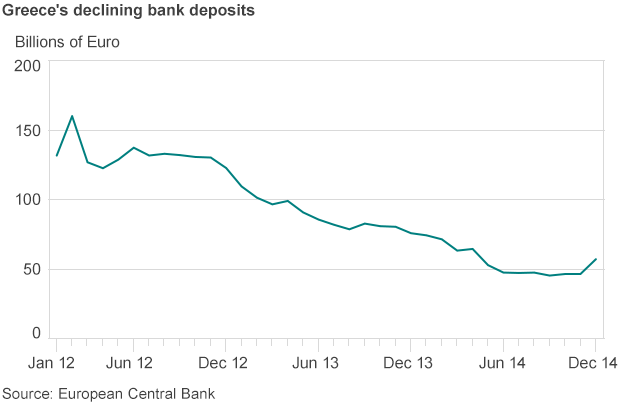If Greece Leaves The Euro Who s Next
Post on: 10 Апрель, 2015 No Comment

Investopedia 23-02-2015 Adam Hayes
Provided by Investopedia If Greece leaves the euro, one of these countries may follow suit.
The new Greek government is currently in talks with the rest of the European Union to secure more favorable terms for their bailout packages and to scale back punishing austerity measures that some believe are keeping its economy from recovering. While talk of a Greek exit has been circulating for a number of years now, it seems that the situation has finally come to a head. By leaving the euro, the Greeks will regain autonomy over their currency and central banking facility, allowing them to default on all or part of their debts and devalue the drachma sufficiently to, hopefully, start anew.
If the Greeks cannot reach an agreement, they threaten to exit the euro currency which will have serious repercussions for the Eurozone economies as well as for the rest of the world. A big worry is that if Greece is able to abandon the euro, contagion will follow and other peripheral countries will also remove themselves from the euro. This would only serve to compound the euro’s problems and risk a global economic catastrophe, which could spell the end for the euro currency experiment. (For more, see: European Union Breakup: Greek Euro Exit . )
The PIIGS
Greece is the ‘G’ in the so-called PIIGS nations of Europe. The rest of these countries are most at risk of following a Greek exit with their own exoduses. (See also:An Introduction to the PIIGS .)
Portugal – As of November 2014, the IMF and European Union facilities have bailed out Portugal to the tune of €79 billion after its economy failed to recover from the great recession. Like the Greeks, the Portuguese are subject to a series of austerity measures aimed at controlling spiraling government debt and one of the largest budget deficits in the Eurozone. The Portuguese government has insinuated that even with bailouts it might never be able to repay its debts unless it could leave the euro and default.
Ireland – Although it was once seen as a burgeoning financial hub, the Great Recession exposed weaknesses in Ireland’s banking system. The country witnessed bank runs and bankruptcies with many of the larger financial institutions requiring recapitalization in the form of guarantees from the EU and IMF who orchestrated bailout packages of over €130 billion. On December 15, 2013, Ireland recovered sufficiently to exit the bailout and even considered early repayment of longer-term obligations. Still, many Irish believe that their economic growth was held hostage to the bailout and if a similar situation were to happen, they would prefer a Plan B scenario whereby they could devalue their own sovereign currency removed from the euro. (For more, see:The Story of the Irish Meltdown . )
Italy – The Italian economy is the largest of the troubled PIIGS, and the fallout from a euro exit would be much more severe than that of a smaller country like Greece or Portugal. Also subject to bailouts, Italian government bonds saw their interest rates soar and their credit ratings slashed. Though restructuring efforts have been underway, its economy has continued to skirt dipping back into recession with a GDP still 10% smaller than before the crisis hit. If Rome sees that smaller countries are able to exit the euro and subsequently devalue their way back to stability, they may decide to follow suit to ease their own pain. (For more, see:How Did Italy Get to This Point . )
Spain –Although Spain was a relative latecomer to the European sovereign debt crisis, it was hit rather hard following the burst of its domestic housing bubble. Again, austerity measures were implemented in return for bailout money and loan guarantees leading to extremely high levels of unemployment and popular dislike of those policies. Spain has estimated that it could take more than a decade for employment to recover. The Spanish banking system experienced bank runs and government debt yields rose making it more expensive for the country to borrow much needed funds externally. The incentive to leave the euro is already strong, as it would allow for a default, wiping the slate clean but conferring massive losses to outside investors and bondholders. If the Greeks leave, it could only embolden the Spaniards. (For more, see:Inside Spain’s Consolidation Program . )
Cypress –While not an ‘official’ PIIGS country, the island of Cypress has had its share of bailouts and bank runs. A small, weak economy, it would make sense for the Cypriots to abandon the euro if the Greeks are able to, and unlike the other peripheral countries, would not cause as much economic pain to the rest of the Eurozone. (For more, see:The Cyprus Crisis 101 . )
The Bottom Line
The situation in Greece is looking bleak and their new anti-austerity government may finally decide to exit the euro. While this is sure to undermine the Eurozone and its currency, the threat of contagion to other weak economies in the EU looms large. The other PIIGS countries, Portugal, Ireland, Italy, and Spain as well as Cyprus, are the most likely candidates for countries who may follow suit. Because of this, all eyes are on Greece right now, watching to see if they can come to an agreement with the rest of Europe. (See also: Bet Against The Euro With EUO ETF .)














